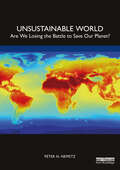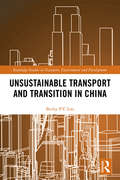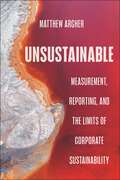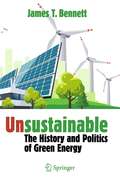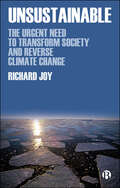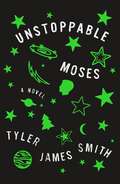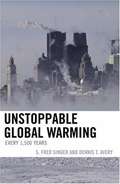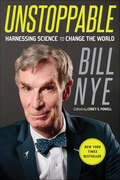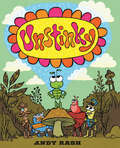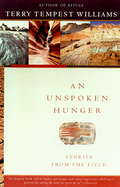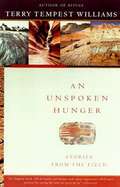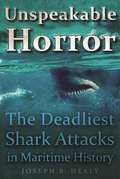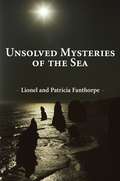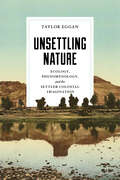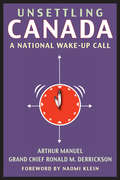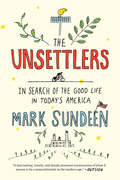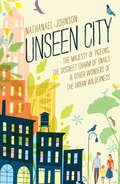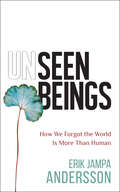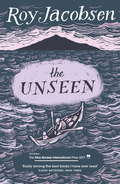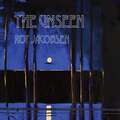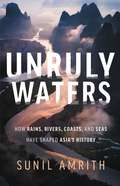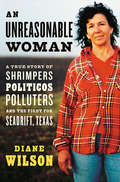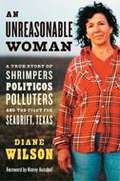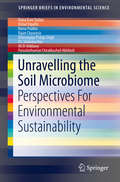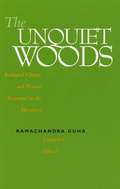- Table View
- List View
Unsustainable World: Are We Losing the Battle to Save Our Planet?
by Peter N. NemetzUsing a cross-disciplinary, science- and economics-based approach, this book provides a sobering and comprehensive assessment of the multifaceted barriers to achieving sustainability at a global level. Organized into three parts, the book defines sustainability in part I and sets the context of the historical and current difficulties facing the world today. In parts II and III, it outlines the sustainability challenges faced in transportation, manufacturing, and agriculture, and then in turn addresses the solutions, conditional solutions, and nonsolutions to these challenges. These include electric and autonomous automobiles, nuclear power, renewable energy, geoengineering, and carbon capture and storage. The author attempts to differentiate among those proposed solutions and discusses which are most promising and which are infeasible, counterproductive, and potentially a waste of time and money. In each of the book’s chapters, the scientific evidence is presented in detail, in keeping with the advice of the young Swedish climate activist, Greta Thunberg, to let the science speak for itself. The author outlines why sustainability is unlikely to be achieved in several key areas of human endeavor and readers are challenged to weigh the scientific evidence for themselves. Using an economic business-based approach, this book introduces students and general readers to the challenges of sustainability and the environmental difficulties facing humanity today.
Unsustainable Transport and Transition in China (Routledge Studies in Transport, Environment and Development)
by Becky PY LooThis book discusses various transport sustainability issues from the perspective of developing countries, exploring key issues, problems and potential solutions for improving transport sustainability in China. It first reviews the current transport sustainability baselines in the three key dimensions of environmental, economic and social sustainability, via an international comparison encompassing both developed and developing countries in different world regions. Then, with a time frame up to 2030, the study groups 100 major Chinese cities according to their baseline conditions, projected population and economic growth, and common sustainability challenges in passenger transport. A systematic attempt is made to discuss the characteristics, strengths and weaknesses of various emerging sustainable transport strategies, including the metro systems, bus rapid transit, light rail, bicycles (and e-bicycles), electric vehicles and walking. Based on the different city clusters identified, the study then explores the opportunities and constraints of introducing a range of emerging sustainable transport strategies through both statistical analysis and detailed fieldwork. Future directions and challenges are identified based on official documents, onsite observations and interviews with local people. The study concludes with thoughts on sustainable transport in smart cities, the importance of governance, local participation, internal and external city movements, and towards a holistic sustainable transport plan. Unsustainable Transport and Transition in China will be of great interest to scholars interested in carbon emissions, climate change, environmental policy, planning, road safety, sustainability, transportation and urban studies, and is relevant to China and other developing countries.
Unsustainable: Measurement, Reporting, and the Limits of Corporate Sustainability
by Matthew ArcherA behind-the-scenes look at how corporate and financial actors enforce a business-friendly approach to global sustainabilityIn recent years, companies have felt the pressure to be transparent about their environmental impact. Large documents containing summaries of yearly emissions rates, carbon output, and utilized resources are shared on companies’ social media pages, websites, and employee briefings in a bid for public confidence in corporate responsibility.And yet, Matthew Archer argues, these metrics are often just hollow symbols. Unsustainable contends with the world of big banks and multinational corporations, where sustainability begins and ends with measuring and reporting. Drawing on five years of research among sustainability professionals in the US and Europe, Unsustainable shows how this depoliticizing tendency to frame sustainability as a technical issue enhances and obscures corporate power while doing little, if anything, to address the root causes of the climate crisis and issues of social inequality. Through this obsession with metrics and indicators, the adage that you can’t manage what you can’t measure transforms into a belief that once you’ve measured social and environmental impacts, the market will simply manage them for you.The book draws on diverse sources of evidence—ethnographic fieldwork among a wide array of sustainability professionals, interviews with private bankers, and apocalyptic science fiction—and features analyses of name-brand companies including Volkswagen, Unilever, and Nestlé. Making the case for the limits of measuring and reporting, Archer seeks to mobilize alternative approaches. Through an intersectional lens incorporating Black and Indigenous theories of knowledge, power and value, he offers a vision of sustainability that aims to be more effective and more socially and ecologically just.
Unsustainable: The History and Politics of Green Energy
by James T. BennettThis book examines the history, politics, and economics of alternative energy. Since the energy crisis of the 1970s, governments around the world have subsidized and otherwise incentivized alternative forms of energy to reduce dependence on fossil fuels. This search has taken on added urgency in the twenty-first century, as the specter of climate change has engendered ambitious state-level renewable portfolio standards, enhanced federal incentives, and inspired “100% renewable” electrical generation targets in such states as Vermont and Hawaii. To save the planet from destruction, wind, solar, and other renewable energy alternatives must replace fossil fuels. But how did we get here and what is the cost? After an in-depth study of the Carter administration's synthetic fuels program, the focus shifts to the two most prominent, perhaps most promising, and certainly most promoted—and government subsidized—“green” and “renewable” energies today: wind and solar. Because wind has made the most headway and drawn the most controversy, it receives the most attention. Although the primary focus is on the American experience with renewable energy, the policies and politics of renewables in Scotland, Wales, Denmark, Spain, and other European nations are also discussed. Issues considered in the book include the nature and efficacy of renewable subsidies; the employment of federal and state tax codes to encourage renewables; the lobbies and interest groups that campaign for government support of renewables; and the fierce battles over the siting of renewable facilities. Unlike other works on this subject, the book probes in depth the nature of the opposition to wind and solar, both in the matter of siting and in their worthiness as recipients of substantial government assistance.
Unsustainable: The Urgent Need to Transform Society and Reverse Climate Change
by Richard JoyThis book is an urgent call to reimagine our social, political and economic systems so that we might transform to a sustainable society. It considers whether an alternative economic model is possible and examines the factors needed to enable such a transition to occur. The scale and pace of change is unprecedented and the author examines the actions that have to be taken by governments, business and individuals if we are to address the environmental disaster that confronts us. Much needs to change but ultimately, this is a book of hope, believing that evolution to a better, more sustainable society is possible.
Unstoppable Moses: A Novel
by Tyler James SmithMoses and his cousin Charlie were best friends, wisecracking pranksters, unstoppable forces of teenage energy—until the night they became accidental arsonists and set in motion a chain of events that left Moses alone, guilt-stricken, and most likely trapped in his dead-end town. Then Moses gets a lucky break: the chance to volunteer as a camp counselor for week and prove that the incident at the bowling alley should be expunged from his record. And since a criminal record and enrollment at Duke are mutually exclusive, he’s determined to get through his community service and get on with his life. But tragedy seems to follow him wherever he goes, and this time, it might just stop him in his tracks.
Unstoppable Global Warming: Every 1500 Years
by S. Fred Singer Dennis T. AveryAdmitting the existence of global warming, but denying that there is scientific consensus surrounding its causes and the threat it poses, Singer (George Mason U.) and Avery (of the Hudson Institute) argue that recent warming is part of a natural cycle of warming and chilling connected to changes in the sun and dispute the evidence regarding humanity's role in driving it through the production of carbons. They also suggest that it is likely to be much less of a problem than many have predicted. Annotation ©2006 Book News, Inc., Portland, OR (booknews.com)
Unstoppable: Harnessing Science to Change the World
by Bill NyeJust as World War II called an earlier generation to greatness, so the climate crisis is calling today's rising youth to action: to create a better future.In UNSTOPPABLE, Bill Nye crystallizes and expands the message for which he is best known and beloved. That message is that with a combination of optimism and scientific curiosity, all obstacles become opportunities, and the possibilities of our world become limitless. With a scientist's thirst for knowledge and an engineer's vision of what can be, Bill Nye sees today's environmental issues not as insurmountable, depressing problems but as chances for our society to rise to the challenge and create a cleaner, healthier, smarter world. We need not accept that transportation consumes half our energy, and that two-thirds of the energy you put into your car is immediately thrown away out the tailpipe. We need not accept that dangerous emissions are the price we must pay for a vibrant economy and a comfortable life. Above all, we need not accept that we will leave our children a planet that is dirty, overheated, and depleted of resources. As Bill shares his vision, he debunks some of the most persistent myths and misunderstandings about global warming. When you are done reading, you'll be enlightened and empowered. Chances are, you'll be smiling, too, ready to join Bill and change the world.In Unstoppable: Harnessing Science to Change the World, the New York Times bestselling author of Undeniable: Evolution and the Science of Creation and former host of "Bill Nye the Science Guy" issues a new challenge to today's generation: to make a cleaner, more efficient, and happier world.Praise for UNDENIABLE:"With his charming, breezy, narrative style, Bill empowers the reader to see the natural world as it is, not as some would wish it to be. He does it right. And, as I expected, he does it best." -Neil deGrasse Tyson, Ph.D, host of COSMOS"Bill Nye, 'the Science Guy,' has become a veritable cultural icon....[T]he title of his new book on evolution...[is] 'Undeniable,' because, yes, there are many Americans who still deny what Darwin and other scientists long ago proved." -Frank Bruni, The New York Times"With a jaunty bow tie and boyish enthusiasm, Bill Nye the Science Guy has spent decades decoding scientific topics, from germs to volcanoes, for television audiences....In his new book, Nye delights in how [evolution] helps to unlock the mysteries of everything from bumblebees to human origins to our place in the universe." -National Geographic"When it comes to Bill Nye, 'Science Guy' doesn't even begin to cover it. When he's not being summoned to act as a voice of reason for news outlets or leading meetings as CEO of the Planetary Society, he is living the life of a best-selling author....His recently published book, 'Undeniable: Evolution and the Science of Creation,' enlightens readers while using a conversational, educational tone. After all, it's his ability to break down even the most complicated topics into bite-size pieces that made him such a hit on his '90s children's show 'Bill Nye, the Science Guy.'" -The Boston Globe"Mr. Nye writes briskly and accessibly...[and] makes an eloquent case for evolution."-The Wall Street Journal"Because [Bill Nye is] a scientist, he has no doubts that the 'deniers' of evolution are flat wrong. And because he's a performer, his book is fun to read and easy to absorb." -The Washington Post"Ignite your inner scientist when Nye, known for delivering geeky intel with clarity and charm, takes on one of society's most hotly debated topics (yes, still)." -Time Out New York
Unstinky
by Andy RashAndy Rash brings the laughs in this humorous story of a stinkbug who can't stink.Bud is a happy stinkbug, except when it comes to stinking contests.He always seems to lose to champions like P. U. Bottoms, Lord Stinkington, and The Fumigator.Every time they make smells like OUTHOUSE, GYM SOCK, and ARMPIT, poor Bud ends up smelling like FLOWERS, or FRESH-BAKED BREAD, or CANDY CANE.Stinking just isn't Bud's THING. But what IS his thing?With an ending as fresh as a daisy, and funnier than any funny smell, Andy Rash puts a hilarious spin on a tale of following your nose to happiness.
An Unspoken Hunger
by Terry Tempest WilliamsWilliams weaves her observations in the naturalist field and her personal experience--as a woman, a Westerner, and a Mormon--into a resonant manifesto on behalf of the landscapes she loves, making clear as well that, through our disregard of this world, we have lost an essential connection to our deepest selves.
An Unspoken Hunger: Stories from the Field
by Terry Tempest WilliamsWilliams weaves her observations in the naturalist field and her personal experience--as a woman, a Westerner, and a Mormon--into a resonant manifesto on behalf of the landscapes she loves, making clear as well that, through our disregard of this world, we have lost an essential connection to our deepest selves.
Unspeakable Horror: The Deadliest Shark Attacks in Maritime History
by Joseph B. HealyThe story of the USS Indianapolis is well-known. After delivering crucial components of the atomic bomb that would level Hiroshima in 1945, the Indianapolis was sunk by a Japanese submarine in the South China Sea. Of the nearly 1,200 men aboard, 900 survived the torpedoing, spilling into the sea. White tip sharks began attacking the next morning and after four days only 300 sailors were alive to rescue. Less famous are the many stories of ships sinking in shark-infested waters with gruesome results. Such as the Cape San Juan, a US troop transport ship that was torpedoed by a Japanese submarine in the Pacific Ocean near the Fiji Islands; nearly 700 of the survivors were killed by sharks. Or the HMS Birkenhead, which sunk off Danger Point, South Africa, in 1852, resulting in 440 shark-related fatalities. In 1927, the luxury Italian cruise liner Principessa Maldafa sank ninety miles off the coast of Albrohos Island while heading to Porto Seguro, Brazil. Nearly 300 who survived the wreck were killed by sharks. In 1909, the French steamer La Seyne collided with British India Steamship Co. liner Onda near Singapore, twenty-six miles from land. One hundred and one people were eventually killed by sharks. In the water, human intelligence is no match for a shark’s brutal, destructive instincts. Sharks are born to kill and eat: They detect distress, smell blood—and attack. Marine disasters such as those above result in humans becoming prey, floating in inner space as shadowy sharks swim below, ready to attack. Helpless to save yourself—floating and waiting, watching the malevolent creatures circle, knowing what will happen . . . a sudden swirl of water, a cloud of blood, the searing pain . . . until there is no more. This is unspeakable horror
Unsolved Mysteries of the Sea
by Lionel And FanthorpeSeas and oceans cover most of the Earth’s surface, yet we know less about what lies beneath them than we do about stars and planets millions of miles away. The seas are filled with intriguing mysteries: How were they formed? What gave rise to stories of sirens, mermaids, and mermen? Where did the old pirates and buccaneers hide their treasure? The answers to these questions and more can be found in Unsolved Mysteries of the Sea.
Unsettling Nature: Ecology, Phenomenology, and the Settler Colonial Imagination (Under the Sign of Nature)
by Taylor EgganThe German poet and mystic Novalis once identified philosophy as a form of homesickness. More than two centuries later, as modernity’s displacements continue to intensify, we feel Novalis’s homesickness more than ever. Yet nowhere has a longing for home flourished more than in contemporary environmental thinking, and particularly in eco-phenomenology. If only we can reestablish our sense of material enmeshment in nature, so the logic goes, we might reverse the degradation we humans have wrought—and in saving the earth we can once again dwell in the nearness of our own being. Unsettling Nature opens with a meditation on the trouble with such ecological homecoming narratives, which bear a close resemblance to narratives of settler colonial homemaking. Taylor Eggan demonstrates that the Heideggerian strain of eco-phenomenology—along with its well-trod categories of home, dwelling, and world—produces uncanny effects in settler colonial contexts. He reads instances of nature’s defamiliarization not merely as psychological phenomena but also as symptoms of the repressed consciousness of coloniality. The book at once critiques Heidegger’s phenomenology and brings it forward through chapters on Willa Cather, D. H. Lawrence, Olive Schreiner, Doris Lessing, and J. M. Coetzee. Suggesting that alienation may in fact be "natural" to the human condition and hence something worth embracing instead of repressing, Unsettling Nature concludes with a speculative proposal to transform eco-phenomenology into "exo-phenomenology"—an experiential mode that engages deeply with the alterity of others and with the self as its own Other.
Unsettling Canada: A National Wake-Up Call
by Naomi Klein Arthur Manuel Grand Chief Grand Chief DerricksonUnsettling Canada is built on a unique collaboration between two First Nations leaders, Arthur Manuel and Grand Chief Ron Derrickson.Both men have served as chiefs of their bands in the B.C. interior and both have gone on to establish important national and international reputations. But the differences between them are in many ways even more interesting. Arthur Manuel is one of the most forceful advocates for Aboriginal title and rights in Canada and comes from the activist wing of the movement. Grand Chief Ron Derrickson is one of the most successful Indigenous businessmen in the country.Together the Secwepemc activist intellectual and the Syilx (Okanagan) businessman bring a fresh perspective and new ideas to Canada’s most glaring piece of unfinished business: the place of Indigenous peoples within the country’s political and economic space. The story is told through Arthur’s voice but he traces both of their individual struggles against the colonialist and often racist structures that have been erected to keep Indigenous peoples in their place in Canada.In the final chapters and in the Grand Chief’s afterword, they not only set out a plan for a new sustainable indigenous economy, but lay out a roadmap for getting there.
The Unsettlers: In Search of the Good Life in Today's America
by Mark SundeenThe radical search for the simple life in today’s America. On a frigid April night, a classically trained opera singer, five months pregnant, and her husband, a former marine biologist, disembark an Amtrak train in La Plata, Missouri, assemble two bikes, and pedal off into the night, bound for a homestead they've purchased, sight unseen. Meanwhile, a horticulturist, heir to the Great Migration that brought masses of African Americans to Detroit, and her husband, a product of the white flight from it, have turned to urban farming to revitalize the blighted city they both love. And near Missoula, Montana, a couple who have been at the forefront of organic farming for decades navigate what it means to live and raise a family ethically. A work of immersive journalism steeped in a distinctively American social history and sparked by a personal quest, The Unsettlers traces the search for the simple life through the stories of these new pioneers and what inspired each of them to look for -- or create -- a better existence. Captivating and clear-eyed, it dares us to imagine what a sustainable, ethical, authentic future might actually look like.From the Hardcover edition.
Unseen City: The Majesty of Pigeons, the Discreet Charm of Snails & Other Wonders of the Urba n Wilderness
by Nathanael JohnsonIt all started with Nathanael Johnson’s decision to teach his daughter the name of every tree they passed on their walk to day care in San Francisco. This project turned into a quest to discover the secrets of the neighborhood’s flora and fauna, and yielded more than names and trivia: Johnson developed a relationship with his nonhuman neighbors.Johnson argues that learning to see the world afresh, like a child, shifts the way we think about nature: Instead of something distant and abstract, nature becomes real—all at once comical, annoying, and beautiful. This shift can add tremendous value to our lives, and it might just be the first step in saving the world.No matter where we live—city, country, oceanside, or mountains—there are wonders that we walk past every day. Unseen City widens the pinhole of our perspective by allowing us to view the world from the high-altitude eyes of a turkey vulture and the distinctly low-altitude eyes of a snail. The narrative allows us to eavesdrop on the comically frenetic life of a squirrel and peer deep into the past with a ginkgo biloba tree. Each of these organisms has something unique to tell us about our neighborhoods and, chapter by chapter, Unseen City takes us on a journey that is part nature lesson and part love letter to the world’s urban jungles. With the right perspective, a walk to the subway can be every bit as entrancing as a walk through a national park.
Unseen Beings: How We Forgot the World Is More Than Human
by Erik Jampa Andersson'Unseen Beings is a magnificent, passionate, brilliantly written manifesto for our urgent reimagining of our relationship with every aspect of the creation… indispensable reading for anyone who longs for a just and balanced human future. Buy it and give it to everyone you know.' Andrew Harvey, author of The Hope A revolutionary perspective on the climate catastrophe bridging history, philosophy, science, and religion.You&’ve heard the hard-hitting data and you&’ve seen the documentaries. But what will it truly take for humanity to change? We will not tackle the climate catastrophe with data alone – we need new stories and new ways of seeing and thinking.By drawing on traditional eco-philosophies and Buddhist wisdom, Erik Jampa Andersson offers an approach to our environmental emergency that will make us rethink the very nature of our existence on this incredible planet. Looking at the climate catastrophe through the framework of disease, Unseen Beings examines our ecological diagnosis, its historical causes and conditions and, crucially, its much-needed treatment, as well as exploring:how and why we constructed a human-centric worldview amazing recent discoveries around non-human intelligencehow religious traditions have dealt with questions of nature, sentience and ecologycritical connections between human health and environmental healthThis book is a call to action. Climate anxiety has left many of us feeling confused and powerless, but there is another way. If we can recover our natural sense of enchantment and kinship with non-human beings, we may still find a path to build a better future.
The Unseen: SHORTLISTED FOR THE MAN BOOKER INTERNATIONAL PRIZE 2017
by Roy JacobsenShortlisted for the Man Booker International Prize and the Dublin Literary Award"An absolute masterpiece. Packed with understated emotion, stunning from beginning to end" Courttia Newland, author of A River Called Time"A masterful and moving work of literature" Kiran Millwood Hargrave, author of The Mercies"Easily among the best books I have ever read" Eileen Battersby, Irish Times"A beautifully crafted novel . . . Quite simply a brilliant piece of work" Charlie Connolly, New European"A blunt, brilliant book" Tom Graham, Financial TimesNobody can leave an island. An island is a cosmos in a nutshell, where the stars slumber in the grass beneath the snow. But occasionally someone tries . . . Ingrid Barrøy is born on an island that bears her name - a holdfast for a single family, their livestock, their crops, their hopes and dreams.Her father dreams of building a quay that will connect them to the mainland, but closer ties to the wider world come at a price. Her mother has her own dreams - more children, a smaller island, a different life - and there is one question Ingrid must never ask her.Island life is hard, a living scratched from the dirt or trawled from the sea, so when Ingrid comes of age, she is sent to the mainland to work for one of the wealthy families on the coast.But Norway too is waking up to a wider world, a modern world that is capricious and can be cruel. Tragedy strikes, and Ingrid must fight to protect the home she thought she had left behind.Translated from the Norwegian by Don Bartlett and Don Shaw
The Unseen: SHORTLISTED FOR THE MAN BOOKER INTERNATIONAL PRIZE 2017
by Roy JacobsenBarrøy Island off the North-western coast of Norway - a holdfast for a single family, their livestock, their crops, their hopes and dreams. And their fears. There is a taint passed down the Barrøy line, and Hans and Maria Barrøy fear their daughter Ingrid may be affected. The early years of the twentieth century prove that Norway cannot stand apart from the wider world - no more than Barrøy island can remain at a remove from the rest of Norway. Hans Barrøy decides to build a quay so that his family can be properly connected to the mainland and with neighbouring islands. In time, Ingrid is sent to serve with one of the rich families on the coast, caring for their two children. But when tragedy strikes - twice in quick succession - she finds herself responsible not only for two newly orphaned children, but for Barrøy Island itself. If they are to survive, she and the other young must learn how to tame this remote earthly paradise for themselves.(P)2016 W F Howes Ltd
Unruly Waters: How Rains, Rivers, Coasts, and Seas Have Shaped Asia's History
by Sunil AmrithFrom a MacArthur "Genius," a bold new perspective on the history of Asia, highlighting the long quest to tame its watersAsia's history has been shaped by her waters. In Unruly Waters, historian Sunil Amrith reimagines Asia's history through the stories of its rains, rivers, coasts, and seas--and of the weather-watchers and engineers, mapmakers and farmers who have sought to control them. Looking out from India, he shows how dreams and fears of water shaped visions of political independence and economic development, provoked efforts to reshape nature through dams and pumps, and unleashed powerful tensions within and between nations.Today, Asian nations are racing to construct hundreds of dams in the Himalayas, with dire environmental impacts; hundreds of millions crowd into coastal cities threatened by cyclones and storm surges. In an age of climate change, Unruly Waters is essential reading for anyone seeking to understand Asia's past and its future.
An Unreasonable Woman
by Diane WilsonWhen Diane Wilson, fourth-generation shrimp-boat captain and mother of five, learns that she lives in the most polluted county in the United States, she decides to fight back. She launches a campaign against a multibillion-dollar corporation that has been covering up spills, silencing workers, flouting the EPA, and dumping lethal ethylene dichloride and vinyl chloride into the bays along her beloved Texas Gulf Coast. In an epic tale of bravery, Wilson takes her fight to the courts, to the gates of the chemical plant, and to the halls of power in Austin. Along the way she meets with scorn, bribery, character assassination, and death threats. Finally Wilson realizes that she must break the law to win justice: She resorts to nonviolent disobedience, direct action, and hunger strikes. Wilson's vivid South Texas dialogue resides somewhere between Alice Walker and William Faulkner, and her dazzling prose brings to mind the magic realism of Gabriel Garcia Marquez, replete with dreams and prophecies.
An Unreasonable Woman: A True Story of Shrimpers, Políticos, Polluters, and the Fight for Seadrift, Texas
by Diane WilsonFor her activism on behalf of Texas Gulf Coast bays, Wilson has been recognized with awards including Mother Jones' Hellraiser of the Month. In her first book, this fourth-generation shrimper relates her battles against a plastics company (and their political allies) whose dumping of toxic chemicals resulted in her county's designation as the nation's most polluted in the late 1980s. Annotation ©2005 Book News, Inc., Portland, OR (booknews.com)
Unravelling the Soil Microbiome: Perspectives For Environmental Sustainability (SpringerBriefs in Environmental Science)
by Rama Kant Dubey Vishal Tripathi Ratna Prabha Rajan Chaurasia Dhananjaya Pratap Singh Ch. Srinivasa Rao Ali El-Keblawy Purushothaman Chirakkuzhyil AbhilashThis book explores the significance of soil microbial diversity to understand its utility in soil functions, ecosystem services, environmental sustainability, and achieving the sustainable development goals. With a focus on agriculture and environment, the book highlights the importance of the microbial world by providing state-of-the-art technologies for examining the structural and functional attributes of soil microbial diversity for applications in healthcare, industrial biotechnology, and bioremediation studies. In seven chapters, the book will act as a primer for students, environmental biotechnologists, microbial ecologists, plant scientists, and agricultural microbiologists. Chapter 1 introduces readers to the soil microbiome, and chapter 2 discusses the below ground microbial world. Chapter 3 addresses various methods for exploring microbial diversity, chapter 4 discusses the genomics methods, chapter 5 provides the metaproteomics and metatranscriptomics approaches and chapter 6 details the bioinformatics tools for soil microbial community analysis, and chapter 7 concludes the text with future perspectives on further soil microbial uses and applications.
The Unquiet Woods: Ecological Change and Peasant Resistance in the Himalaya
by Ramachandra GuhaThe Unquiet Woods, Ramachandra Guha's path breaking study of peasant movements against commercial forestry, offers a new epilogue that brings the story of Himalayan social protest up-to-date, reflecting the Chipko movement's continuing influence in the wider world.
